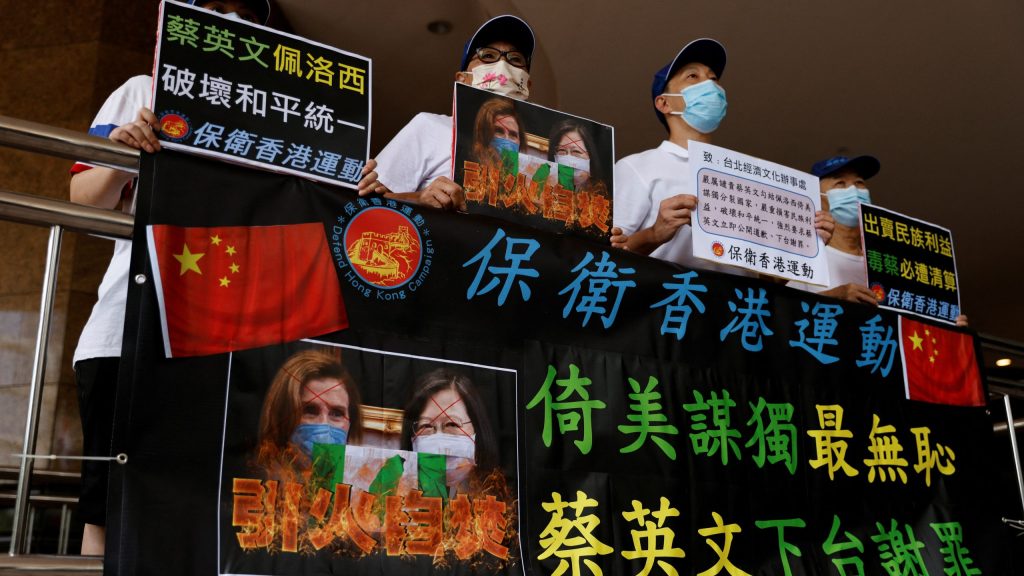Jeremy Mark

China’s response to US House Speaker Nancy Pelosi’s recent visit to Taipei—launching missiles and conducting aggressive naval and air exercises—has changed the military status quo in the waters surrounding Taiwan. But Beijing’s economic actions—barring imports of various Taiwanese food products, as well as ending Chinese exports of sand—appear designed to leave cross-strait trade largely undisturbed.
This imbalance highlights the uncomfortable truth facing Chinese leader Xi Jinping as he turns up the heat in the Taiwan Strait: Both countries’ economies stand to lose if the situation continues to escalate. While Taiwan, powered by its world-leading semiconductor industry, is experiencing solid growth, China’s economy is poised on a knife’s edge—its vaunted economic “miracle” undermined by a real-estate crisis and Xi’s “zero-COVID” policies.
The fortunes of China and Taiwan are built on co-dependence, and the ties that have developed over the past generation to bind key industries like electronics cannot be severed without damaging both countries. That’s not even mentioning the suppliers, manufacturers, financiers, investors, and consumers around the world who rely on the same supply chains.
Had Beijing been serious about imposing economic punishment on Taiwan for hosting Pelosi, it could have targeted its economic ties with Taipei more directly. For example, it could have disrupted the export of Taiwanese electrical products to the mainland, which last year totaled more than 50 percent of the country’s $189 billion of exports to China and Hong Kong. It could have also seriously impeded the flow of goods through the Taiwan Strait, one of the most important waterways in the world for container vessels. Indeed, Goldman Sachs predicts that lasting restrictions on cross-strait trade would be “highly damaging” to the Taiwan economy and “highly disruptive” to technology supply chains.
But such actions also would amount to Beijing shooting itself in the foot. China’s export machine would be crippled without Taiwan-made electronic components (let alone all the other imports offloaded at its ports). This delicate balance was underlined by a Taiwanese finance ministry official, who told reporters after Pelosi departed that “Taiwan’s and China’s electronics industries are highly dependent on each other. Therefore, we expect very little chance of China imposing stricter economic sanctions on Taiwanese businesses.”
Pelosi’s most important meeting in Taipei may have been with the current and former chairmen of Taiwan Semiconductor Manufacturing Company (TSMC), the world’s leading producer of advanced chips. TSMC—whose sales to China fell to about 10 percent of its total revenue last year from 20 percent two years ago, thanks largely to a US ban on chip shipments to Chinese cellphone maker Huawei Technologies Co.—is building a $12 billion factory in Phoenix. With US President Joe Biden’s signature on the CHIPS and Science Act, which contains $76 billion of subsidies and tax relief for chip makers that build factories on American soil, the meeting was a signal of which way TSMC increasingly is leaning. Last year, the United States accounted for 64 percent of the company’s sales revenue—a figure that’s only likely to rise, especially in light of consistent reports that the Taiwanese giant could build as many as six plants in Arizona.
Ultimately, Beijing’s sanctions against Taiwan after the Pelosi visit were little more than symbolic. Agricultural products and foodstuffs came to only 0.23 percent of China’s imports from Taiwan in the first six months of 2022, and most of the one hundred-plus Taiwanese companies directly affected by the sanctions focus on small market niches. So Beijing’s propagandists resorted to claiming that the ban on food exports like citrus and fish products was aimed at punishing supporters of Taiwan’s ruling Democratic Progressive Party—even though some rural producers are have traditionally been supporters of the opposition Kuomintang.
Another Chinese media outlet claimed the ban on sand exports would hurt Taiwan’s semiconductor makers, who use highly processed quartz sand to produce chips. But Chinese sand imports are normally used by Taiwan’s construction industry, and quartz sand can be sourced elsewhere around the world. Besides, China’s share of Taiwanese sand imports has fallen from nearly 80 percent in 2012 to under 10 percent last year.
Finally, the Chinese government-run Economic Daily News told its domestic audience that the sanctions on Taiwan would add pressure to an economy beset by “reduced export sales, rising prices and a recession” and that its lower and middle classes are “threatened by a spiraling cycle of poverty.” But that was a description better suited to China, whose growth rate in the second quarter of 2022 sank to 0.4 percent—well below Taiwan’s growth of 3.08 percent. Many Chinese citizens and businesses have been battered by widespread zero-COVID shutdowns that have, among other things, raised youth unemployment to nearly 20 percent.
Just as worrying is the state of China’s property market, where home sales have plummeted this year as at least twenty-eight of the country’s top one hundred property developers have defaulted on loans and bonds.
None of this negates the economic problems Taiwan actually faces. Income inequality is a serious issue, especially for labor-intensive industries and a younger generation that has a hard time finding good jobs or affording apartments. And declining industries won’t benefit from the semiconductor boom (which extends well beyond TSMC). Yet still, investors seem to be more worried about Chinese investments; stocks listed on China’s exchanges have fallen for six weeks, with the news from the Taiwan Strait further fueling worries about the country’s economic prospects.
While shares in Taipei took a small hit after the Pelosi visit, the mood was much less dire than during the last confrontation with China in 1995-96, when China for the first time fired missiles into waters near Taiwan and the market fell some 20 percent.
What does all this tell us? In short, Taiwan has come to regard Beijing’s threats and military exercises as business as usual—especially when it comes to trading with a bully.
No comments:
Post a Comment